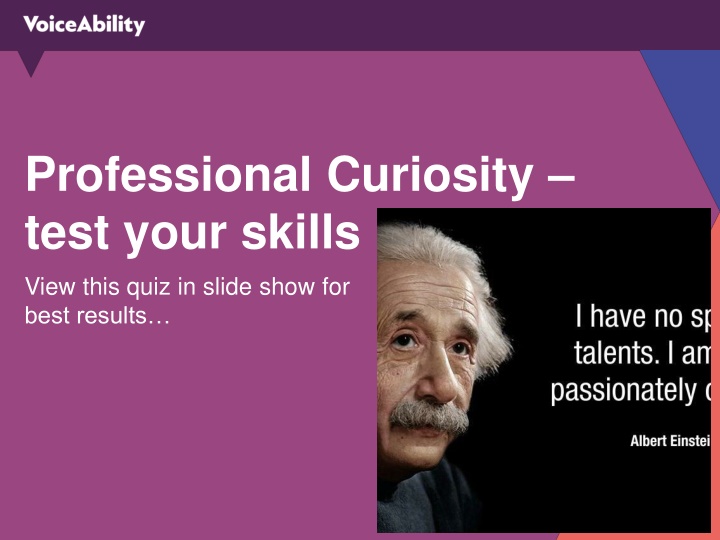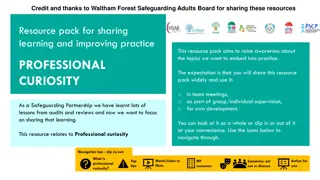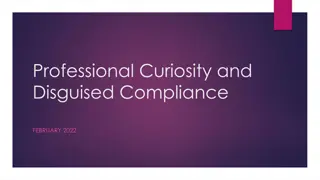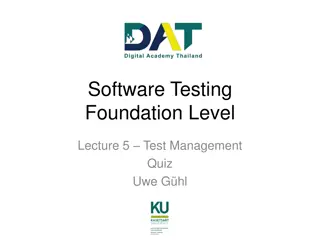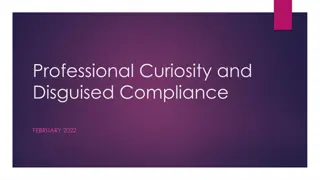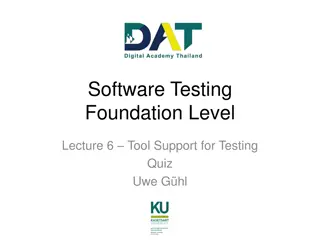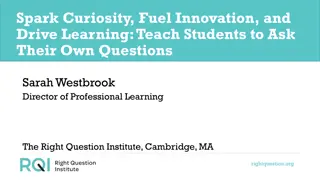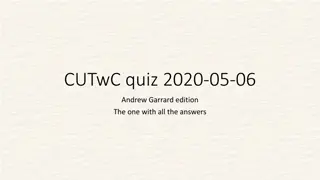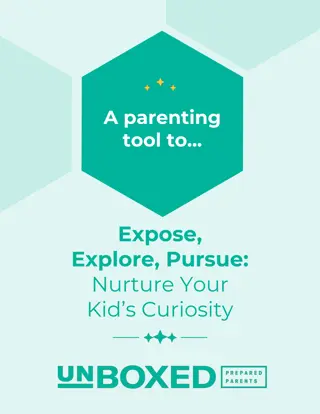Professional Curiosity Test: Enhance Your Skills Through Interactive Quiz
Explore the realm of professional curiosity with a comprehensive quiz focusing on essential aspects such as questioning, challenging, and acquiring knowledge in various scenarios. Dive into a thought-provoking examination that tests your ability to navigate complex situations with confidence and empathy. Elevate your skills and mindset through engaging questions and insightful answers.
Download Presentation

Please find below an Image/Link to download the presentation.
The content on the website is provided AS IS for your information and personal use only. It may not be sold, licensed, or shared on other websites without obtaining consent from the author.If you encounter any issues during the download, it is possible that the publisher has removed the file from their server.
You are allowed to download the files provided on this website for personal or commercial use, subject to the condition that they are used lawfully. All files are the property of their respective owners.
The content on the website is provided AS IS for your information and personal use only. It may not be sold, licensed, or shared on other websites without obtaining consent from the author.
E N D
Presentation Transcript
Professional Curiosity test your skills View this quiz in slide show for best results
1. Professional Curiosity is? (which of these statements apply) a) finding out everything that is going on in an institution b) having the confidence to question and challenge c) thinking the unthinkable d) knowing the right questions to ask e) listening carefully to what you are told f) not believing anything that professionals tell you g) remaining respectfully uncertain
2. According to a study by Kashdon et al.,2013 professionally curious practitioners are people who a) want and like acquiring knowledge have a lot of time on their hands can tolerate anxiety and uncertainty are humorous have unconventional ways of thinking are non defensive and non critical in attitude b) c) d) e) f)
3. If a health professional tells you that your advocacy client does not want to see you what should you do ? a) go ahead with the visit anyway b) ask the professional the reason for this. c) ask if it would be possible to see the person just to check with them d) explain to the professional that advocacy is a legal right and therefore you must carry out the visit e) record the reasons given
4. You visit a hospital ward and are told that the person you are visiting is in segregation, you should ? a) explain why it is important that you are allowed to visit them anyway b) explain that they have a legal right to advocacy c) ask the person in segregation what happened d) if they would struggle to explain this, then using a non instructed approach, request this information from other sources, such as care notes, speaking to family
5. You notice that someone you support has a bruise, you should .? a) tell them you re sorry to see they ve been hurt remind them that you are independent and don t work at the hospital not mention it as you know from past experience they don t like to talk about things like this tell them that you are concerned to see they have a bruise and ask how this happened if they would struggle to explain what happened then using a non instructed approach, request this information from other sources, such as care notes, speaking to family b) c) d) e)
6. Professional curiosity is so important to safeguarding because? a) abuse is not always visible to visiting professionals the care act makes clear the duty to use this in all our safeguarding interactions not everyone who is experiencing abuse can tell people about it abusive organisations may be good at looking like they care often all we have to go on are the small signs that things aren t right it is essential that other professionals know that we are serious about safeguarding b) c) d) e) f)
Answers! 1. b,c,d,e,g 2. a,c,d,e,f 3. a,b,c,d 4. b,c,e 5. b,d,e 6. a,c,d,e,f
